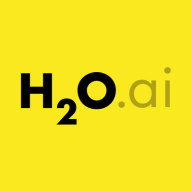

Databricks and H2O.ai are competing platforms in data analytics and machine learning. Databricks has an edge in scalability and integration, making it suitable for handling vast amounts of data, while H2O.ai excels with specialized AI capabilities, appealing to users needing comprehensive machine learning functions.
Features: Databricks offers superior integration with Apache Spark and cloud services, robust data processing capabilities, and a collaborative environment. It also supports seamless use of multiple programming languages and provides a user-friendly notebook interface. H2O.ai delivers strong machine learning capabilities, including AutoML for automating model training, a centralized AI platform to streamline development, and support for Jupyter Notebooks to enhance collaborative efforts.
Room for Improvement: Databricks could enhance its deep learning support and simplify certain advanced machine learning tasks. An increase in available customer support channels would also be beneficial. H2O.ai may improve its scalability and ease of integration with external systems. Offering a wider range of built-in algorithms could attract users looking for more out-of-the-box solutions.
Ease of Deployment and Customer Service: Databricks provides cloud-native deployment, ensuring quick setup and scalability with strong technical support and training resources. H2O.ai offers flexible deployment options, including both cloud and on-premise solutions, along with comprehensive support focused on deep learning applications and AI-specific guidance.
Pricing and ROI: Databricks offers flexible pricing models that can align well with its scalable infrastructure, often yielding favorable ROI for large-scale data operations. H2O.ai tends to have a higher initial cost, but its advanced AI features can lead to substantial returns, especially for applications that benefit from specialized machine learning.
| Product | Market Share (%) |
|---|---|
| Databricks | 13.9% |
| H2O.ai | 1.7% |
| Other | 84.4% |


| Company Size | Count |
|---|---|
| Small Business | 25 |
| Midsize Enterprise | 12 |
| Large Enterprise | 56 |
| Company Size | Count |
|---|---|
| Small Business | 2 |
| Midsize Enterprise | 3 |
| Large Enterprise | 7 |
Databricks offers a scalable, versatile platform that integrates seamlessly with Spark and multiple languages, supporting data engineering, machine learning, and analytics in a unified environment.
Databricks stands out for its scalability, ease of use, and powerful integration with Spark, multiple languages, and leading cloud services like Azure and AWS. It provides tools such as the Notebook for collaboration, Delta Lake for efficient data management, and Unity Catalog for data governance. While enhancing data engineering and machine learning workflows, it faces challenges in visualization and third-party integration, with pricing and user interface navigation being common concerns. Despite needing improvements in connectivity and documentation, it remains popular for tasks like real-time processing and data pipeline management.
What features make Databricks unique?In the tech industry, Databricks empowers teams to perform comprehensive data analytics, enabling them to conduct extensive ETL operations, run predictive modeling, and prepare data for SparkML. In retail, it supports real-time data processing and batch streaming, aiding in better decision-making. Enterprises across sectors leverage its capabilities for creating secure APIs and managing data lakes effectively.
H2O is a fully open source, distributed in-memory machine learning platform with linear scalability. H2O’s supports the most widely used statistical & machine learning algorithms including gradient boosted machines, generalized linear models, deep learning and more. H2O also has an industry leading AutoML functionality that automatically runs through all the algorithms and their hyperparameters to produce a leaderboard of the best models. The H2O platform is used by over 14,000 organizations globally and is extremely popular in both the R & Python communities.
We monitor all Data Science Platforms reviews to prevent fraudulent reviews and keep review quality high. We do not post reviews by company employees or direct competitors. We validate each review for authenticity via cross-reference with LinkedIn, and personal follow-up with the reviewer when necessary.